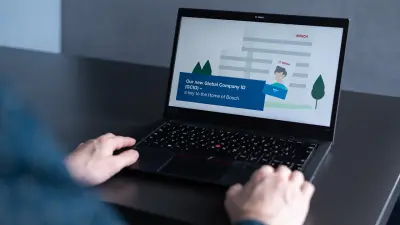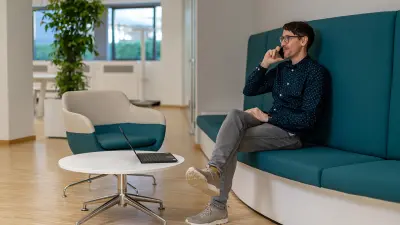How Solution Architecture opens doors worldwide
Enrico, Solution Architect at Bosch Global Real Estate
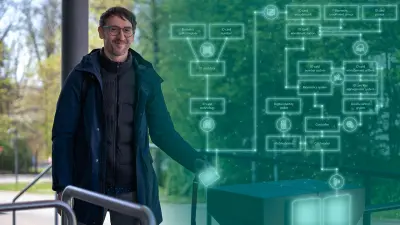
Which IT systems are currently in place in Bosch buildings around the world, which do colleagues at the site need and how can we push forward the integration of digital solutions? These are the questions that Solution Architect Enrico — together with his colleagues in the Global Real Estate department — deal with every day. For example, Enrico and his project team are currently working on a globally usable company ID card for all Bosch associates. What drives him at work is the creative freedom, global responsibility and the opportunity to help others and develop himself in the process.
Step by step to the new global company ID card
“Our vision and therefore the goal from the outset was to standardise the various ID cards at Bosch worldwide whilst making them secure at the same time,” reports Enrico, Solution Architect in the Global Real Estate digitalisation team. “Bosch associates currently can't use their existing company ID cards when travelling to sites in other countries, for example. They have to register at reception like other visitors.”
In addition to access control, the company ID cards are also a constant companion for colleagues in their day-to-day work: “They use them to pay in the canteen, print out documents or hire a car from the fleet. There are many ways to use them and the systems differ from location to location. As a first step, we therefore conducted a study on the exact status of the project in order to better understand potential challenges involved,” says Enrico, who is in charge of the project.

About the Global Real Estate digitalisation team
The Global Real Estate (GR) service division at Bosch is tasked with breaking down silos and joining-up the various Bosch locations worldwide. The mission of the GR digitalisation team is to develop innovative and secure digital solutions for Bosch buildings worldwide. The team members record the needs of individual people, locations or regions via a ticket system and aim to fulfil their wishes in the best possible way. Once a ticket has been received, the colleagues check, evaluate and prioritise the request. If everything fits, they move on to implementation and look for suitable IT solutions, develop new processes or implement additional services, such as studies or individual consultations. The digitalisation team focuses on computer-aided facility management (CAFM), the company's own master data system which contains all underlying processes and the systems required for building information modelling (BIM).
The study into ID cards across the globe
Enrico and his colleagues started the project with a study: “We started by defining key terms for the study and built a strong communication base for the project with the glossary we created. We also conducted fifty interviews with experts from all over the world to better understand the existing ID cards and the systems behind them. At Global Real Estate, we have a cloud-based master data system in which central data such as the locations or the area information of the buildings is stored,” explains Enrico proudly, who is also responsible for master data maintenance in the team. What was still missing, however, was the information about the company ID cards: “We have therefore added the information collected from the study to our database, which means we now have an accurate picture of the current status worldwide. This allows us for example to specify the card technology and encoding used for ID cards at the Bengaluru site in India, along with the types of card readers and access control systems in place, and the total number of ID cards utilized by our colleagues on site.”
Pilot implementation
With the situation and goal defined, it was time to move forward with the implementation: “In addition to the Bosch headquarters in Gerlingen, there are many other locations in the greater Stuttgart area. Associates move between them regularly — due to projects or because they want to work in phases at a Bosch coworking space close to home, for example. The region is therefore an ideal setting for a pilot project aimed at gathering experience of implementing a centralised company ID card system,“ says Enrico.
“The increased compatibility of the company ID cards should improve the user experience — among other things through increased spatial flexibility. Of course, in addition to the tangible benefits for associates, we are also focussing on the economic factors: We expect that our measures will enable us to optimise costs in the long term — for example, by reducing the number of back-end systems. The pilot in the Stuttgart area will help us to check the extent to which our expectations are actually being met,” says Enrico.
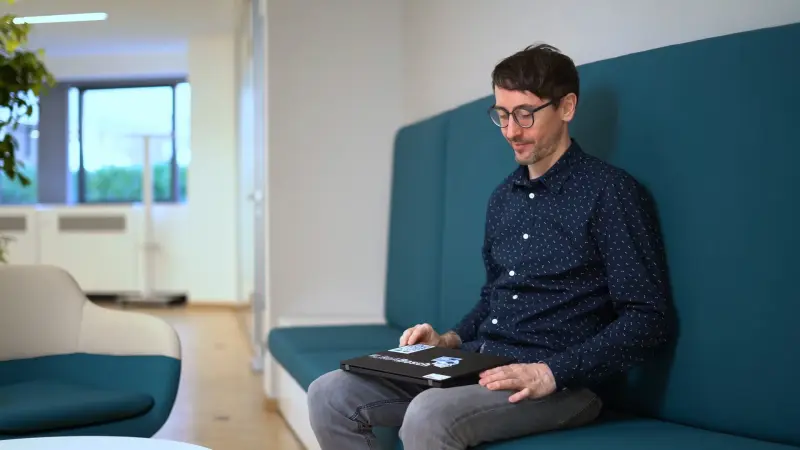
Using data for optimal results
In addition to tangible projects such as the global company ID card, Enrico and his colleagues are also working on overarching transformation processes: “We live in the data age. This means that we should also use available data, for example, to make sustainable economic decisions,” says Enrico. “Our portfolio encompasses various properties and buildings. Leveraging the data gathered from these buildings enables us to make informed decisions.”
“Smart buildings are a must, especially for today's sustainability goals. For example, we are currently optimising the energy management of our buildings. Our aim is to comprehensively capture energy data by strategically deploying measuring devices, allowing for centralised evaluation, visualisation, and optimisation of energy consumption within the building. This should of course be an automated process.”
In addition to new systems, Enrico and his colleagues also regularly review the efficiency of the existing IT landscape: “We look at the IT applications in use and check how many are redundant and which of them we can reduce or combine. One example of this is the access control system: until now, many locations have operated the same back-end IT system locally in-house. It makes sense to operate a system centrally or at least in suitable regional clusters. This allows us to reduce costs and increase operational efficiency. We proactively advise locations with a different system to make the switch. It's fun to pass on our own knowledge, develop data-driven suggestions and advise and support colleagues on their way to a solution,” reports Enrico.
Achieving success together
What’s special about working in Solution Architecture at Bosch? For Enrico, one thing is certain: “It’s the people who are part of our fantastic international Solution Architects community. I’m always fascinated when I meet new people through projects. There are so many inquisitive, creative and innovative colleagues working in our company — that’s fantastic. I really enjoy exchanging ideas with them!”
“We have also developed our own Bosch Solution Architecture Framework in our company. This can be compared to a modular toolbox that we can use during our work. The framework has also been recognised internationally by the certification institution ‘The Open Group’ for the certification process to become an ‘Open Certified Architect’ — something we are particularly proud of as Bosch associates,” emphasises Enrico.
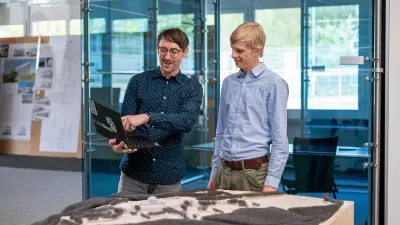
Change and future development
The world is constantly changing. For Enrico, transformation is a central part of it. “For us in the software sector in particular, it's important to stay on the ball. Once we have introduced new software in a region, it doesn't mean that it will be used by associates there forever. Change isn’t always a bad thing; it’s crucial for our own growth and development.”
This point becomes even clearer when looking at Enrico's current personal project: “I want to continue my training as part of the Professional Development Journey. I’m currently an Associate Architect — my goal is to reach the next level, becoming a Master Architect. The path to the next level is comparable to a degree programme with theoretical and practical components: In addition to a curriculum, a 40-hour training course is part of the certification, among other things,” says Enrico. “Bosch provides support with training courses and a platform for exchanging experiences — certification then takes place together with ‘The Open Group’.”
The Professional Development Journey
The Professional Development Journey (PDJ) is part of the Bosch Architects Profession. It is aimed at the professional development process and is designed to continuously improve the skills, knowledge and experience of architects. As a result, the PDJ increases the quality of architectural work in the respective organisational units. In total, there are five levels of professionalisation that associates can achieve: Aspiring Architect, Associate Architect, Senior Architect, Master Architect and Chief Architect. Certification is carried out by the consortium ‘The Open Group’ — in cooperation with Bosch.
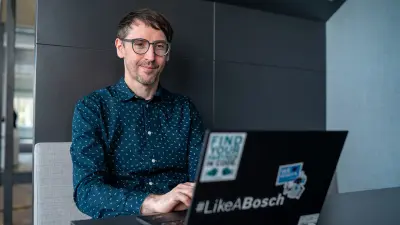
From Dresden via Stuttgart to the world
Enrico lives in Dresden, which is where he also started at Bosch. Since moving to Global Real Estate, he has been employed in Stuttgart and therefore regularly visits southern Germany: “I'm in the office once a month for several days. We have established one workshop day per month, for which I like to be on site. Otherwise, I go to Stuttgart as required.” The rest of the time, Enrico works from home: “At first, I couldn't even imagine working remotely. Now I really enjoy it. There is less travelling, and I have a lot of freedom to organise my day. Of course, that's not possible with every job. I'm now very happy and grateful that it's possible to pursue my passion and balance it with my home life in Dresden.”
“The special thing about my job is that I often have calls, even when I'm in the office. Despite many of my colleagues being based in Stuttgart, I often work very closely with associates from other countries. I'm eager to immerse myself in new subject areas, understand technological innovations, and brainstorm potential solutions — and digital collaboration fits perfectly into this. For instance, we frequently use online boards to gather current status updates and explore possible solutions.”
For Enrico, the focus is on regular dialogue — and his colleagues agree: “Discussing data strategies with Enrico is great. It keeps me up-to-date with the latest developments at the Global Real Estate department and allows me to recognise opportunities for our region,” confirms Bruno, Senior Engineer at Bosch in Brazil. As a specialist in digitalisation and sustainability, he's part of a team of experts focusing on digitalisation, energy, and global corporate identity — this means Bruno and Enrico collaborate regularly.
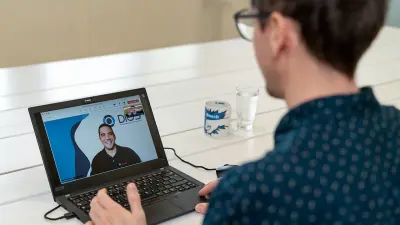
Profile
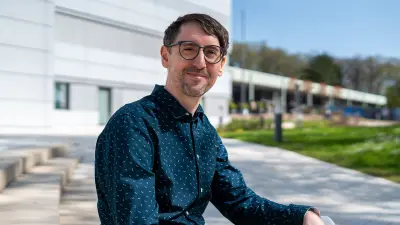
Enrico Neuber
Solution Architect at Bosch
Enrico is a Solution Architect specialising in data architecture at Bosch. He studied computer science at the University of Dresden. After graduating, he started his career as a systems expert in the semiconductor industry. He became aware of Bosch through the construction of the semiconductor plant in Dresden. At the end of 2018, he joined the company as a Solution Architect and helped build the 300 mm semiconductor factories. In 2022, Enrico moved to the newly founded Global Real Estate service division, where he works as part of the digitalisation team on innovative and secure digital solutions for the Bosch world.
